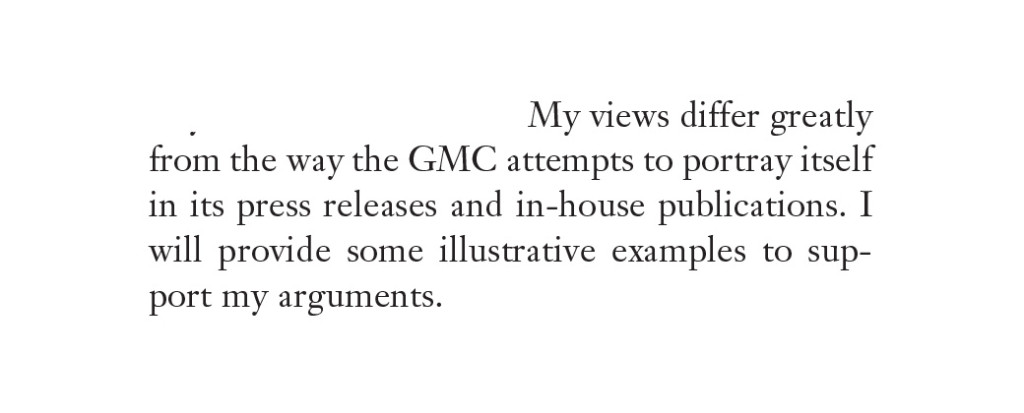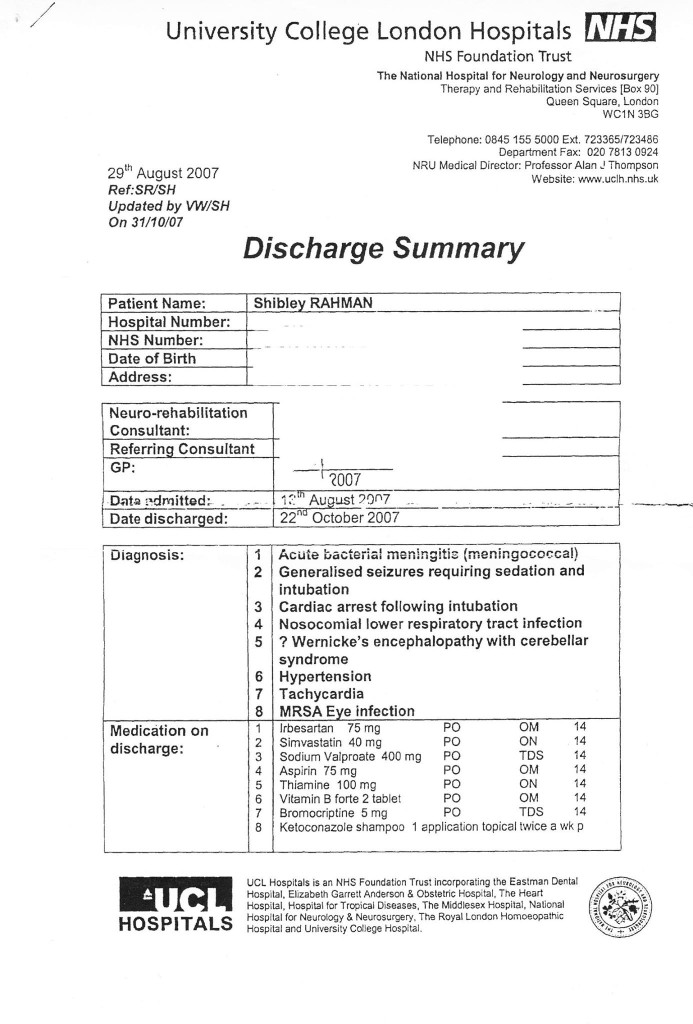Home » Posts tagged 'inquiry'
Tag Archives: inquiry
I can see why some Doctors would be driven to suicide. I was mentally ill, and felt the same with the GMC FTP.
At least 96 doctors have died while facing a fitness-to-practise investigation from the General Medical Council since 2004, though it is not clear how many of these cases were suicide.
I can understand exactly how this has happened.
I had a prolonged GMC investigation between 2004 and 2006. At no point during this process was I told when then this mentally arduous process would come to an end.
I think now, seven years into recovery, that there by the grace of God go I.
The media have a remarkably high level of detail of understanding from the perspective of the General Medical Council about forthcoming cases. It is impossible for the Doctor to get his side across in the media.
The GMC claim they don’t do show trials.
But my father was fully humiliated with the media storm.
My father was faced with a Doctor son who was in denial and lacked insight. My father is now dead, but I should like to say he probably died in complete humiliation of his son.
My experience is of a GMC which plays to people’s weaknesses in low self esteem and low confidence, a personality trait shared by many with addiction disorders.
Not one report in the mainstream media reported that I was severely alcoholic. And yet the GMC, prior to their erasure of me, erased me with five independent reports stating clearly that I had at least a severe alcohol problem; and that I needed help.
One of the referrals to the GMC was when I attended the A&E of a hospital with acute intoxication. In addition to the referral to the GMC by the Consultant in A&E, I was not offered any post-event support for alcoholism.
The GMC know how to present themselves in the media, but this is in contradistinction to the experience of those who have experienced the Fitness to Practise process first hand.
Dr Peter Wilmhurst writes in 2006 in a wide-ranging criticism of the GMC as follows:
In wishing to infer ‘bad character’, the General Medical Council must not go beyond its statutory duty of promoting public safety. Otherwise, there is simply mission creep and a torrent of smears into a hate campaign by the regulator or its company.
In 2005, one year before I was eventually due to see the GMC, I was suspended. This was due to an alcoholic bender in Northwick Park. I was crying all day in a pub because I could not cope with the investigation any more.
I had waved goodbye to my late father, and lied to him saying I was going shopping.
I didn’t. I ended up being sectioned by a psychiatric hospital in North London, and my father spent ages talking to the medical staff there.
I was then suspended. It was at that point, I wished to call it a day.
I phoned the Samaritans, and they talked me out of it.
I have never told anyone this story. I feel very strongly about what the General Medical Council did to me, even though it might have been merely a product of their inefficiency.
Nobody appears to wish to want to change the system. I’m pretty sure that there are juniors who wish to hold tight until they are Consultants.
What happened to me is that I had consultants in two Trusts in West and North London who said I was ‘late for work’, ‘smelling of alcohol’ and ‘dishevelled’.
None of this got reported in the main media.
I was erased. To this day, I still have no idea who retrospectively complained in graphic detail about my alcoholism did not offer me sick leave, or help with occupational health.
One of them even had the gall to write in his witness statement for the GMC that he gave me the phone number of a private clinic.
I find this particularly ironic as I was later done for incompetence, when that North London trust had allowed me to finish my medical job there, successfully running cardiac arrests there. I passed my Advanced Life Certificate there. I even have the certificate to prove it.
I feel disgusted by the way that the General Medical Council goes about its business.
Far too many one-sided media reports appear in the media containing detailed accounts, as yet unproven. There’s a sense of being hung before you even go to the gibbet.
I am now in my seventh year in recovery. I have done four books, and my Bachelor of Law, Master of Law and Master of Business Administration.
I even completed my pre-solicitor training, as I am regulated by the Solicitors Regulation Authority.
My late father died two months before the Solicitors Regulation Authority gave me permission to finish my legal training, after a meticulous consideration of various factors including details of my erasure.
I am now applying to be restored. And so everything gets racheted up again. The dogs will get unleashed.
And so far they’ve dragged me up to the City where I was struck off, without my late father, surrounded by the same bars and clubs and restaurants. I didn’t have a relapse. Care and compassion are simply two words which are not in the GMC’s dictionary.
I am even applying to go to a desk, non “facing job”. I am now following my erasure newly disabled, so I would not wish to do clinical medicine in any form.
I do not want to be in public health with the stigma of having been erased, for a period of life when I was very ill, and the undoubted discrimination that that would entail.
I had one year of sitting in a pub all day after I was eventually erased in 2006.
This was an extremely dangerous part of life. For my father, it was unbelievably distressing. Nonetheless, he came to visit me every day on the ITU when I was in a coma due to this a year later.
I so understand why there have been so many deaths of Doctors waiting GMC FTP. That could easily have been me.
But I am fighting fit now, and looking forward to my hearing very much.
A discredited government which the country is disgusted at
If you were a trader in shares of Osborne plc, on the basis of this afternoon’s session in the Commons, you’d be urging your fellow commodity sellers to cheer the mantra of ‘Sell, Sell, Sell’. David Cameron and George Osborne has made a very grave error of judgment, as the pathology in the culture of the banking industry is not just restricted to the LIBOR fraud from Barclays. Don’t let the BBC deceive you – the Government has been proven to be a moral cesspit, and the country is completely exasperated.
Bob Diamond in a incoherent set of responses yesterday in the Commons Select Committee, best described as ‘implausible’, was unable to explain why senior ‘LIBOR’ setters, who had apparently been doing the job for decades, were oblivious to the emails from traders publicly wishing the LIBOR rate to be fixed. He had no explanation why it took so long to get to senior management, and provided that the compliance officers had had a duty to report criminal malpractices. This is reminiscent of the “shock” experienced by Rupert Murdoch when he found out about the morally repugnant phone hacking which had apparently occurred at News International. The problem is that ignorance is no defence in our law at least, where company directors are, despite promoting the success of the company, are supposed to act with due care, skill and diligence.
On 28 July 2012, Rachel Reeves claimed that the Chancellor made a conscious decision to exclude LIBOR from the Financial Services Bill in its current form, even when he must have known that a massive FSA investigation into the scandal. It is hard to know how corporate governance mechanisms have failed so dramatically in News International and Barclays, but there is nothing more off-putting to a corporate investor than a large company, albeit running profitably, committing openly criminal activity to pursue its aims.
This afternoon, Ed Balls utterly annihilated George Osborne’s speech, like taking candy from a baby. Balls effectively told him to ‘put up or shut up’, asking him effectively to prove his nasty allegations or desist from making them. The involvement of the Bank of England over LIBOR and the gilt markets is far from clear, and the only way to achieve a solution on this is an independent judicial-inquiry. It is a complete non-argument to say that it is too time-consuming and too costly, as those might have been the same grounds of opposition for the Leveson Inquiry which has gone a long way to showing that the pathology was substantially more than some ‘rogue reporters’. The parliamentary select committee is not able to examine witnesses with the skill of a lawyer, or QC, and probably yesterday afternoon was the best advertisement yet for a judicial-led inquiry.
While this issue runs-and-runs, there can only be lasting damage for David Cameron, whose personal poll ratings are at an all-time low. There will be no closure from a parliamentary inquiry, aided and abetted by the Liberal Democrats who are expected to be electorally obliterated in 2015. The most damaging label for David Cameron is that of the Flashman identity, of a man completely ‘out-of-touch’. The judiciary is the only lifeline for restoring the credibility of the legislature, and a judiciary-led inquiry is the only way for MPs as a collective group to restore their damaged reputation. Cameron is damaged signficantly, the country is most unimpressed, and this could prove to be fatal for this government.





